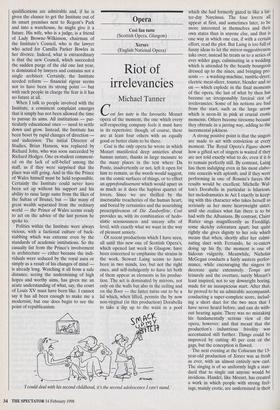Opera
Cosi fan tutte
(Scottish Opera, Glasgow) Xerxes (English National Opera)
Riot of irrelevancies
Michael Tanner
Cosi fan tutte is the favourite Mozart opera of the moment, the one which every self-respecting company feels it must have in its repertoire; though, of course, there are at least four others with an equally good or better claim to be there.
Cosi is the only opera he wrote in which Mozart manifested deep anxieties about human nature, thanks in large measure to the many places in the text where Da Ponte, inadvertently or not, left it open for him to remain, as the words would suggest, on the comic surfaces of things, or to effect an approfondissement which would upset us as much as it does the hapless quartet of lovers. Since we are thrilled by the inscrutable treacheries of the human heart, and bored by certainties and the nourishing prescriptiveness of Die Zaubetflote, Cosi provides us, with its combination of hedo- nistic sensuousness and uneasy sifts of level, with exactly what we want in the way of pleasant anxiety.
Of recent productions which I have seen, all until this new one of Scottish Opera's, which opened last week in Glasgow, have been concerned to emphasise the strains in the work. Stewart Laing seems to have been in two minds, too, but not the right ones, and self-indulgently to have let both of them appear as elements in his produc- tion. The set is dominated by mirrors, not only on the walls but also in the ceiling and on the floor — the latter turns out to be a lid which, when lifted, permits the by now non-virginal (in this production) Dorabella to take a dip up to the waist in a pool I could deal with his second childhood, it's the second adolescence I can't stand.' which she had formerly gazed in like a lat- ter-day Narcissus. The four lovers all appear at first, and sometimes later, to be more interested in themselves and their own states than in anyone else, and that is one way in which one can, if with a certain effort, read the plot. But Laing is too full of funny ideas to let the mirror-suggestiveness take over; instead he treats us to a series of ever wilder gags, culminating in a wedding which is attended by the beastly bourgeois dressed up to the nines, and bringing pre- sents — a washing-machine, tumble-dryer, electric meat-slicer, toaster, blender and so on — which explode in the final moments of the opera, the last of what by then has become an irresponsibly farcical riot of irrelevancies. Some of his notions are bad from the start, such as the large arrow which is neon-lit in pink at crucial erotic moments. Others become tiresome because they obtrude in a jarring way, adding to the incremental jokiness.
A strong positive point is that the singers are made to act with conviction at every moment. The Royal Opera's Figaro shows how a gifted set of singers is wasted if they are not told exactly what to do, even if it is to remain perfectly still. By contrast, Laing has them indulging even in his most elabo- rate conceits with aplomb, and if they were performing in one of Rossini's farces the results would be excellent. Michelle Wal- ton's Dorabella in particular is hilarious, her melodramatics in Act I exactly in keep- ing with this character who takes herself as seriously as her more heavyweight sister, until she realises what fun there is to be had with the Albanians. By contrast, Claire Rutter sings magnificently as Fiordiligi, some sketchy coloratura apart; but quite rightly she gives dignity to her role which means that when, shortly after her culmi- nating duet with Ferrando, he re-enters doing up his fly, the moment is one of hideous vulgarity. Meanwhile, Nicholas McGegan conducts a fairly austere perfor- mance, while encouraging the singers to decorate quite extensively. Tempi are leisurely and the overture, surely Mozart's least inspired, not to say downright boring, made for an inauspicious start. After that, he proved to be an admirable accompanist, conducting a super-complete score, includ- ing a short duet for the two men that I have never heard before, and can do with- out hearing again. There was no mistaking his fundamentally serious view of the opera, however; and that meant that the production's industrious frivolity was accentuated still further. Things could be improved by cutting 40 per cent of the gags, but the conception is flawed.
The next evening at the Coliseum the 13- year-old production of Xerxes was as fresh as ever, with an almost entirely new cast. The singing is of so uniformly high a stan- dard that to single out anyone would be invidious. Handel, like Mozart, has created a work in which people with strong feel- ings, mainly erotic, are undermined in their confidence. This is a function, though, not of deep insight into the springs of emotion and of will, but rather of the notoriously complicated, even ludicrous, plot. The res- olution of the whole work doesn't bring, as it does in Cosi, a feeling of scepticism about human beings' capacity ever to learn anything about themselves, but simply a good laugh at the last twist of a story which veers between ingenuity and imbecility, the latter winning by some distance. The opera is mainly a series of ravishing solipsistic arias, of such quality that tedium is nearly always kept at bay, certainly in a produc- tion and performance as sharp and immac- ulate as this. This is the kind of show that can be revived indefinitely, a good thing since that is exactly what it looks as if ENO intends that it should be.


























































 Previous page
Previous page